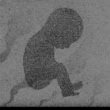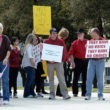During our short August break, we were transfixed by the televised images of Cindy Sheehan and her vigil near the president’s home in Crawford, Texas. We asked our friend, the political observer Tom Engelhardt, to sum up this development for our readers. Engelhardt, who runs the Nation Institute’s Tomdispatch.com website, is the author of The End of Victory Culture, a history of American triumphalism in the Cold War. He manages here not only to capture the spirit of one woman’s defiant stance but also to sketch the outlines of a presidential administration in disarray. A version of this article also appeared on Tom’s website.
Over the last two years, officials in the Bush administration have never ceased to talk about “turning corners” or reaching “tipping points” and achieving “milestones” in the Iraq War that won’t end. Now it seems that one woman—Cindy Sheehan, the mother of a soldier killed while on duty in Iraq—may change that dynamic. Her spontaneous act of opposition—her decision to head for Crawford, Texas, to face down a vacationing president and demand an explanation for her son Casey’s death—may produce the first real tipping point of the war.
Casey Sheehan had one of the small “critical roles” in the country’s “current global commitment”—a commitment in Iraq that, in Secretary of Defense Donald Rumsfeld’s words, “has to have a deterrent effect on people.” As it happens, Sheehan was one of the unexpectedly deterred and now, along with 1,863 other American soldiers, is interred, leaving his mother Cindy—a one-person anti-war movement—with a critical role to play in awakening Americans to the horrors, and dangers, of the Bush administration’s imperial plans.
As a million news articles and TV reports have informed us, Sheehan was stopped about five miles short of her target, the presidential “ranch” in Crawford, and found herself camping out unceremoniously in a ditch at the side of a Texas road. And yet somehow, powerless except for her story, she has managed to take the president of the United States hostage. She mysteriously transformed August’s news into a question of whether the president will entirely get away with ignoring her as he helicopters over her encampment on the way to meet with Republican donors, or drives right past her in a tinted-windowed black SUV.
In her person, in her story, in her version of “the costs of war,” Cindy Sheehan has managed to express many of the tensions of our present moment. And in the process she has also exposed the growing weakness and confusion of the Bush administration.
CONFUSION IN THE RANKS—Ellen Knickmeyer of the Washington Post reported in August that “a U.S. general said . . . the violence would likely escalate as the deadline approached for drafting a constitution for Iraq.” For two years now, “the violence will escalate when” has been the phrase of choice from American officials trying to cover themselves in this spiraling mess. For the phrase “drafting a constitution” in that general’s quote, you need only substitute “after the killing of Saddam Hussein’s sons” (July 2003), “after handing over sovereignty” (June 2004), “after voting for a new Iraqi government” (January 2005)—or, looking ahead, “after voting on the constitution” (October 2005). It is always something.
After each “spike in violence,” Bush officials or top commanders insist that they have the insurgency under control, only to be ambushed by yet another “spike.” This May, for example, more than three months after violence was supposed to have receded in the wake of the Iraqi election, Chairman of the Joint Chiefs Gen. Richard Myers offered a new explanation—the “recent spike in violence represents an attempt to discredit the new Iraqi government and cabinet.” You’d think that someone in an official capacity would conclude, sooner or later, that Iraq was a spike in violence.
It is widely accepted that George W. Bush’s administration has been the most secretive, disciplined, and on-message in our history. So, what an out-of-control couple of weeks for the president! His polls were at, or near, historic lows; his Iraq War approval numbers dipping below 40 percent. As he was preparing for his presidential vacation in Crawford, George and his advisers couldn’t even agree on whether we were in a “global struggle with violent extremism” or in a “global war on terror.” (The president finally opted for war.) And he was, of course, leaving behind in Washington a Special Counsel, Patrick Fitzgerald, called into being by his administration but now beyond its control, who held a judicial sword of Damocles over key presidential aides (and who can probably parse sinking presidential polls as well as anyone).
Iraq has been at the heart of everything Bush hasn’t been able to shake off, at least since May 2, 2003. On that day the president co-piloted a jet onto the USS Abraham Lincoln, an aircraft carrier halted off the San Diego coast (lest it dock and he only be able to walk on board). Togged out in a military uniform, he declared “major combat operations” at an end, while standing under a White House–produced banner reading Mission Accomplished. Ever since then, George has been on that mission (un)accomplished and Iraq has become a black hole, sucking in his administration and the American military along with demented neocon dreams.
The Iraqi insurgency that should never have happened, or should at least have died down after thousands of its fighters were killed or imprisoned by the American military, inconveniently managed to grow ever stronger and to turn August into a bloody month for American soldiers. Sixteen Marine Reservists from a single unit in Ohio were killed in a couple of days; seven soldiers from the Pennsylvania National Guard were killed, again, over a few days. Thirty-seven Americans were reported to have died in Iraq in the first 11 days of the presidential vacation, putting American casualties at the top of the TV news night after night.
And yet the administration has seemed capable only of standing by helplessly, perhaps stubbornly, refusing to give an inch on the “compassionate” president’s decision not to visit grief-stricken communities in Ohio or Pennsylvania, or ever to be caught attending the funeral of one of the men or women he sent abroad to die. He did manage, however, to leave his ranch to fly to the Sandia National Laboratories in New Mexico to sign his energy bill and also to hobnob with those millionaire Republican donors.
REVOLT OF THE MILITARY BRASS—In this same period, cracks in relations between an increasingly angry military command in Iraq and administration officials back in Washington began to appear for all to see. The issue, for desperate military officers, was—as for Cindy Sheehan—how in the world to get our troops out of Iraq before the all-volunteer military apparatus went over an Iraqi cliff.
As July ended, our top general in Iraq, George W. Casey, announced (with many conditional “ifs”) that we should be able to start drawing down American troops significantly by the following spring—that tens of thousands of them were likely to leave then, and tens of thousands more by the end of 2006. Donald Rumsfeld initially backed him up, if somewhat edgily. Then, as Rumsfeld hedged, more military people jumped into the media fray with leaks about possible Iraq drawdowns, and there was a sudden squall of front-page articles on withdrawal strategies for a hard-pressed administration in an increasingly unpopular war.
At the same time, confusingly, reports began to surface indicating that, because of another of those prospective “spikes” in violence, the administration would actually be increasing American troop strength in Iraq before the December elections there, by 10,000 to 20,000 soldiers.
Finally, after a war council of the Rumsfeld and Rice (Pentagon and State Department) “teams” in Crawford on August 11, the president held a press conference (devoted in part to responding to Cindy Sheehan) and explained the withdrawal strategy in an ad-style near-jingle: “As Iraqis stand up,” he intoned, “we will stand down.”
But in a week in which the American general in command of transportation in Iraq announced that attacks on his convoys had doubled over the past year, such words sounded empty.
Nonetheless, Bush told the press that day he was pleased about “progress” in Iraq. (“And we’re making progress training the Iraqis. Oh, I know it’s hard for some Americans to see that progress, but we are making progress.”)
“Pulling the troops out would send a terrible signal to the enemy,” the president insisted as he turned to the matter of withdrawal. He then dismissed drawdown maneuvers as “speculation and rumors”; and, on being confronted by a reporter with the statements of some military men who’d been interviewed, he added, “I suspect what you were hearing was speculation based upon progress that some are seeing in Iraq as to whether or not the Iraqis will be able to take the fight to the enemy.”
While that may sound vague, it was nonetheless the sound of a president who (along with his secretary of defense) having always promised to abide by whatever his generals in the field wanted, was now disputing those commanders in public. General Casey was also reportedly “rebuked” in private for his withdrawal comments. Our commanders in Iraq are, of course, the official realists in this war, having long ago given up on the idea that the insurgency could ever be defeated by force of U.S. arms.
In fact, the Bush administration’s occupation of Iraq—as historian Howard Zinn put it recently, “We liberated Iraq from Saddam Hussein, but not from us”—is threatening to prove one of the great catastrophes in recent military history. A ragtag bunch of fighters, now estimated in the tens of thousands, using garage-door openers and cell phones to set off roadside bombs, and egg-timers to fire mortars at U.S. bases, have battled the U.S. military at least to a draw.
Previously, rumors of withdrawal followed by a quiet hike in troop strength might have simply been another clever administration attempt to manipulate the public and have it both ways. At the moment, however, such contradictory moves seem to be a sign not of manipulation but of confusion, discord, and uncertainty about what to do next.
CINDY AND THE MEDIA—And then, as if matters weren’t bad enough, there was Cindy Sheehan. She drove to Crawford with a few supporters in a caravan of perhaps a dozen vehicles and an old red, white, and blue bus with the blunt phrase Impeachment Tour written on it. She carried with her a tent, a sleeping bag, some clothes, and evidently not much else. She parked at the side of the road and camped out—and the next thing anyone knew, she had forced the president to send out not the Secret Service or some minor bureaucrat but two of his top men, National Security Adviser Stephen Hadley and Deputy Chief of Staff Joe Hagin. Rather than being flattered and giving ground, she just sent them back, insisting that she would wait where she was to get the president’s explanation for her son’s death.
There she was as people she inspired began to gather—the hardy women of Code Pink; other parents whose children had died in Iraq; a former State Department official who had resigned to protest the onrushing Iraq War; a political consultant and a team of public relations professionals; antiwar protesters of all sorts; and, of course, the media. Trapped in no-news Crawford with a president determined to give them less than nothing, and sympathetic to a grieving mother, reporters found themselves with an irresistible story at a moment when they could actually run with it.
Hundreds of news articles, almost every one sympathetic to the distraught mother and her altar boy son, poured out. Sheehan was suddenly on the morning TV shows and the nightly news, where a stop-off at Camp Casey or the Crawford Peace House was suddenly de rigueur. And the next thing you knew, there was the president at his news conference forced to offer “sympathy” to the grieving woman at the side of the road five miles from his home whom he wasn’t about to invite in.
Talk about asymmetric warfare. One woman against the massed and proven might of the Bush political machine and its major media allies (plus assorted bloggers), and though some of them started whacking away immediately at Cindy, she remained unfazed.
The Crawford press corps had their own ideas about who exactly Cindy Sheehan should be to win over America. They would paint a strikingly consistent, quite moving, but not completely accurate picture of her. They would attempt to tame her by shearing away her language, not just the profanity for which she was known, but the very fierceness of her words. She had no hesitation about calling the president “an evil maniac,” “a lying bastard,” or the administration “chickenhawks,” “warmongers,” “shameful cowards,” and “war criminals.” She called for the president’s impeachment, and for the jailing of the whole top layer of the administration. She called for American troops to be pulled out of Iraq now. And most of this largely disappeared from a much-softened media portrait of a grieving antiwar mother.
In a world where horrors are referred to euphemistically, or limned in politely, or artfully ignored, Sheehan does something quite rare—she calls things by their names. And it was her very bluntness, her ability to shock by acting as she saw fit, that led to her breakthrough and that may help turn a set of unhappy public opinion polls into a full-scale antiwar movement.
THE TIPPING POINT?—As President Bush likes to speak about “our mission of defeating terrorists” in the world, so too Cindy Sheehan has found herself on a mission. The president speaks resolutely of “staying the course” in Iraq. That’s exactly what Sheehan is planning to do in Crawford (and undoubtedly beyond). She was forced to leave her post in mid-August when her mother was hospitalized following a stroke. At our press time, she was indicating her intention to return soon to Camp Casey, which thanks to a Crawford neighbor of the president is being moved onto a one-acre plot even closer to Bush’s ranch.
George prides himself on not flinching, giving ground, or ever saying he’s sorry. In this regard he has had remarkably good luck until he ran into Cindy. In his presidential runs, in Congress, or elsewhere, he really hasn’t come up against an opponent who was ready to dig in and duke it out with him. Whatever she may have been before, Cindy Sheehan was beaten into just that shape on the anvil of her son’s death.
Last week, the Pentagon relieved a four-star general of his command allegedly because he had an affair, while separated from his wife, with a woman not in the military or the government; and yet not a single top official or high-ranking officer (except for scapegoat Brig. Gen. Janice Karpinski) has suffered for American acts at Abu Ghraib, or for torture and abuse at our prison in Guantanamo, or for any of the Iraq disasters.
In such a context, the words “please hold someone accountable” by the mother of a son killed in Iraq, a woman on a mission who doesn’t plan to back down or leave off anytime soon—well, that truly constitutes going directly for the president’s political throat. It’s mano a mano time, and while I would never underestimate what this administration might do, I wouldn’t underestimate the fierce power of an angry mother either. The Bush administration is in trouble in Iraq, in Washington, and in Crawford.






0 Comments